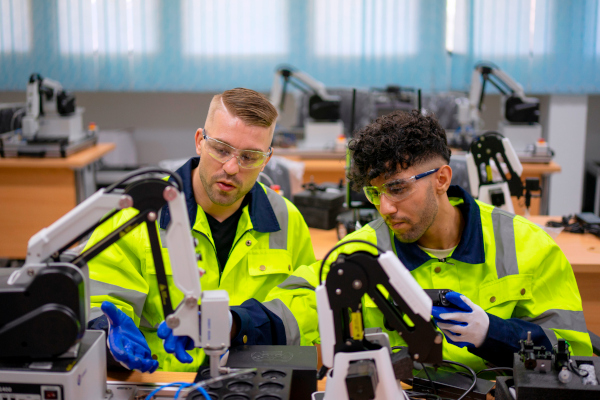Supply chains have faced immense pressure over the last few years. From shipping delays and materials shortages to an ongoing labor shortage, the need for innovative solutions is growing.
The solution for many is to invest in technology. According to research from the 2023 MHI Annual Industry Report, nearly three in four (74%) supply chain executives are increasing their investments in technology. Unfortunately, technology can’t do it all, with respondents also citing “lack of adequate talent” as a major hindrance to implementing technologies such as artificial intelligence (AI) or the internet of things (IoT).
Upskilling has emerged as another strategy companies are adopting to fill the skills and knowledge gaps of their current employees. Good supply chain management will come down to a healthy combination of investment in both technology and human skills to maintain these systems.
In addition to filling the skills gap, upskilling plays a crucial role in recruiting and retaining qualified workers, which was cited as the leading challenge in the MHI report.
According to the Harvard Business Review, companies that encourage employees to take advantage of upskilling opportunities for personal or professional growth see improved employee engagement and retention. A 2021 workforce survey conducted by LinkedIn supports this, noting employees overwhelmingly rate learning and growth opportunities as the number one marker of an exceptional workplace. Another LinkedIn survey also found that on average, companies who excel at promoting career advancement and growth keep employees almost twice as long as companies who don’t.
Artificial intelligence requires rethinking of education and training
It’s clear education and training must evolve to maintain pace with advancing technologies like AI, but getting a handle on what skills gaps exist within your organization can be a challenge. According to Karen Panetta, fellow at IEEE, when it comes to AI, being able to understand data is a good place to start.
“While everyone may not need to know how to design an AI algorithm, everyone will need data literacy to understand the important questions to ask when using AI,” she says. These questions include:
• What data was used?
• How was it sourced?
• Was it representative of all the populations?
• When looking at metrics that claim “99% accuracy,” understanding that this is not providing a complete picture and should never be used to justify the AI is “correct.”
Panetta says employees should also be able to explain how AI makes decisions and understand the bias that can creep into these systems. For example, if AI is being used to evaluate human performance and a low score is generated, the human operator must have an understanding on whether the underlying elements being measured are representative of an individual’s performance.
Encouraging the development of security and trust is also very important. “Security will continue to dominate all of technology and change the way we educate future engineers and technologists,” says Panetta. “We not only have to teach students how to design for the intended uses of a product, but also need to have them consider how someone with ill intentions can abuse and misuse the same technology we built for social good.”
SC
MR


Latest Supply Chain News
Latest Podcast

 Explore
Explore
Software & Technology News
- Nine questions are the key to AI success in building resilient supply chains
- Looking back at NextGen 2024
- AI is moving omnichannel closer to the customer
- How technological innovation is paving the way for a carbon-free future in logistics and supply chains
- Körber Supply Chain Software’s Craig Moore says MercuryGate acquisition is about the customer
- Robotic use grows by 10%
- More Software & Technology
Latest Software & Technology Resources

Subscribe

Supply Chain Management Review delivers the best industry content.

Editors’ Picks




